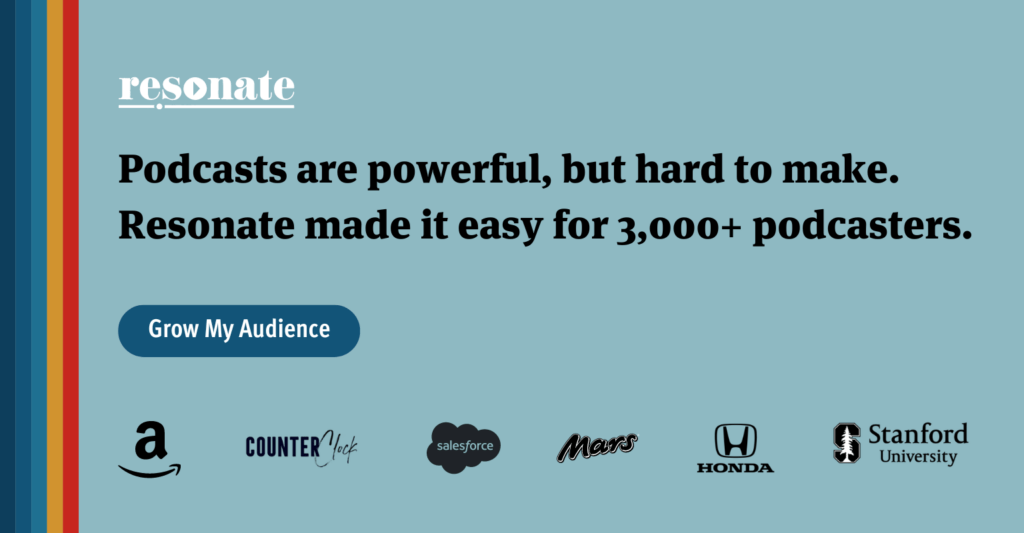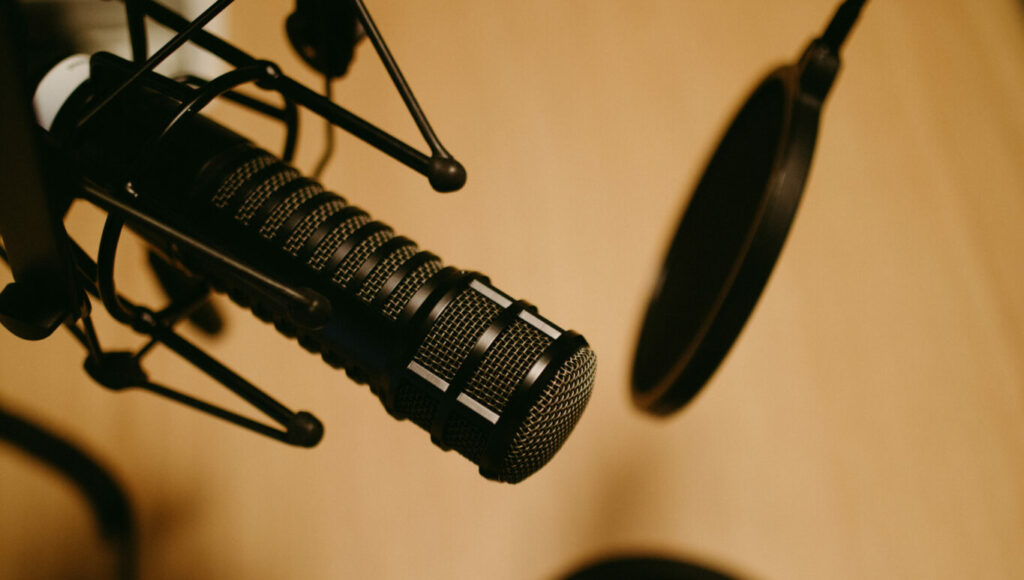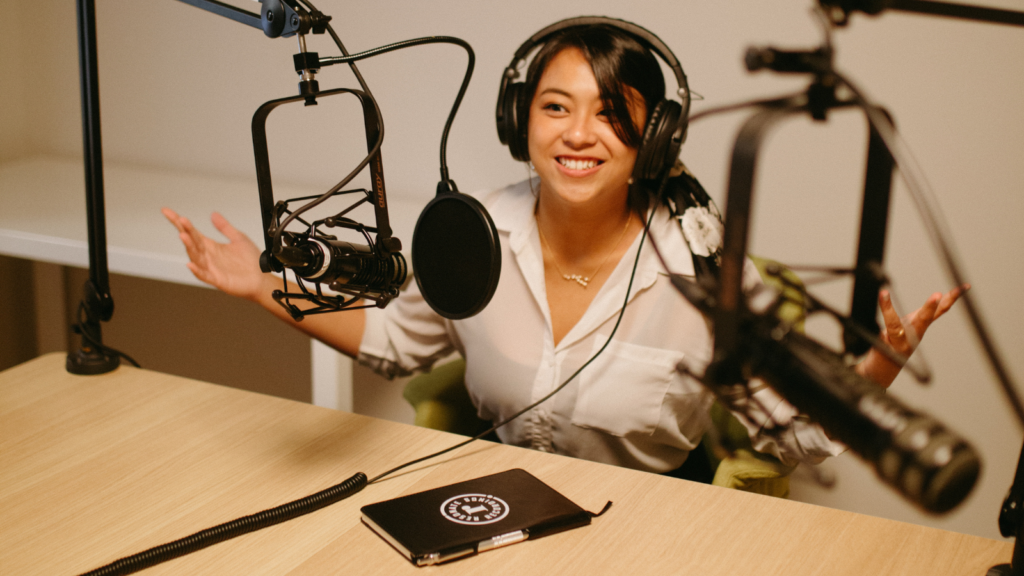We don’t have to tell you how important podcasts have become to our collective consciousness.
They keep us company, they inform us, they make us cry, they make us laugh, they even solve cold cases! With so many styles out there it’s hard to know which one is right for you, but one thing remains constant; the host can separate the professionals from the amateurs. We here at Resonate want to give you the ultimate host toolbox to help you get your pod to the top of the charts. Just follow these tips, trust yourself, and have fun!
Pre-production: Prepping for the interview
Pre-production is everything you do before you press record and is the secret to every successful podcast. When done well, it can seem like the hosts are just making it all up on the spot. SHHH, I won’t tell anyone that you actually did a lot of work to get there. Trust me, it’ll be worth it!
1. Put the season before the episode
Think about each episode in the context of the entire season. It’s helpful to sketch out the next 5-10 episodes so your show has a sense of purpose and direction. The goal is to hone in on a simple theme so it can appeal to a wide audience as well as be intentional towards your show’s greater goal. While we’re at it, define who your audience is and write themes with them in mind. Keep in mind that either your topic or story should be super strong, and compelling or your guest should be. Both are a bonus!
2. Find the most compelling guest on that topic
Come up with 3-4 criteria the guests must meet before they get the green light to be on the podcast, this will make for a stronger podcast if the guests are vetted. Some examples are: “Must have prior voiceover experience,” “Must be an expert on the topic,” “Must live locally to chat live,” or “Must have own recording equipment.” Select the standard that you want each guest to meet and don’t waver. It is also highly recommended that you schedule a pre-interview call with them to confirm their experience and compatibility (more on that later).
3. Do your homework and research, research, research!
After your guest has been carefully vetted, now it’s time to do your research on who you are interviewing to get the full picture of the person as well as the topic at hand. This is a sign of respect to your guest. It also does a great deal for the flow of conversation. Look for nuggets that have never been covered before or things you’ll have in common with that person to make for natural conversation.
- Ex. Search [Their Name] + [Interviews]
- Ex. Search [Their Name] + [Topic]
- Ex. Search [Their Name] + [Biography]
- Ex. Search [Their Name] + [Reddit]
- Ex. Search [Their Name] + [Podcast]
- Ex. Search their social media presence [Facebook, Twitter, Instagram, Linked In]
- Ex. Search YouTube: Person and Topic,
- Ex. Ask guests for a resume or a bio if they don’t have a social media presence to get some background info.
- Check any “about” pages on relevant websites
4. The right questions are the window to the soul
Well, sort of… it’s more like the window to a great podcast! To get there, generate a list of questions (Min 3, Max 10) that showcases all that hard-earned research you did! I like to recommend the questions follow a story arch of their own with a “Beginning” (ie. How did the guest or topic get started), “Middle” (ie. Where is the guest or topic at now), and “End” (Where is this guest or topic headed in the future. This is also a great place to ask for advice or illicit predictions).
Use these questions as talking points to reference throughout the interview, not as a strict script to adhere to. Read your questions out loud to yourself to make sure everything makes sense and you are comfortable with how they are worded and how they direct the flow of conversation. Make sure each question is direct and pointed to encourage focused answers from your guest. Avoid open-ended questions like “tell me about yourself” (unless you love long-winded monologues). Always try and fish for as many “stories” as possible through your line of questioning (more on that later.)
Ask yourself: Are my questions playing it too safe? Do they push buttons and encourage a debate or dialogue? Do they dig deeper into a well-worn topic or stay on the surface? Do my questions coax out personal stories or stay fact-driven and dry? Would I ask this in a conversation? Will this instigate some introspection? How will the answer to this question further my episode and drive the point of my theme?
5. Share questions ahead of time
Once you’ve got your holy grail of about 10 well-curated questions…don’t keep them to yourself! Share the list of questions with your guest to get them comfortable with what you will be talking about. No need to surprise them on the day! It will give them a chance to prepare some thoughtful, and concise answers. Encourage your guest to bullet point out their biggest story to avoid long monologues and have them pre-organize their thoughts, especially if this is their first time.
Though we are all about sharing, I always like to keep 2 questions to myself that the guest hasn’t seen to make sure I get them to speak candidly on something unexpected, this prevents the interview from feeling too rehearsed or stale.
Oh, and one more thing. Don’t forget to listen! Lots of hosts focus so much on what they are going to say next that they forget to listen. Don’t be this person. Thank you!
6. Prior prep calls prevent poor podcast performance
Say that three times fast! Use this call to lay the ground rules and the groundwork for your day-of recording. Test equipment, feel out the guest’s comfort levels and develop a sense of rapport. This will give you a clear sense of their interview style, topics to cover that you may not have thought about prior and can help set the tone for what kind of answers you’re looking for. Feel free to answer any of their questions, and make them feel as at ease as possible during this chat.

7. Create a beat sheet
A beat sheet is an outline that prepares a roadmap for the interview and keeps you on track before recording. This looks like this:
- BEAT 1 – INTRO (With several bullet points of things you’d like to make sure you get to in the intro)
- BEAT 2 – INTRO GUEST
- BEAT 3 – INTERVIEW (Bullet out questions and any additional observations or thoughts you might have in relation to each question)
- BEAT 4 – TRANSITIONS (Bullet out or take note of any transitions you’d like to verbalize between topics)
- BEAT 5 – SEGMENTS (Bullet out any recurring segments you might have and make sure they are covering everything you intend to hit in this “beat”.
- BEAT 6 – OUTRO (Bullet out any recaps, thoughts, and thank you’s)
This will give you a bulletproof cheat sheet on the day of recording and give you confidence that you know exactly how to steer the ship!
8. Listen to those who have talked before you
Have fun scrolling the charts and listening to the vast array of podcasts that are out there. Now that you know what it takes to put in the work, you will appreciate the podcasts you listen to in a whole new light. Take note of interview styles, hosting personalities, effortless scripting, questions asked, guests featured, and music incorporations. Take notes of what you learned and see how you can integrate some of these techniques and emulate some of the greats that are out there. Someday very soon it will be your podcast that people will want to emulate.
Production: The interview
So you are prepped like a pro, now it’s time to rock the mic like a vandal…or so Vanilla Ice says, who’s in no way a podcaster, but you get what I mean. Ok, let’s put that new pre-pro knowledge to the test and channel our inner Oprah for your next interview. This section will include best practices for audio equipment, interview styles, and techniques as well as some tips and tricks to getting your best-sounding voice recordings. Let’s do it!
1. You are only as good as your audio equipment
Your podcast may have amazing, thought-provoking content, but if it’s recorded poorly, listeners are more likely to tune out. Invest in yourself and in professional quality equipment that will set you apart from the rest. Familiarize yourself with how to use these things and make sure your guest is also up to speed with their gear. This tutorial will help you get comfortable with the proper microphone technique. Need help? This tutorial will help you prepare for recording time by knowing some other best practices.
2. Location, location, location!
You may have all the best equipment available, but if you are recording in your shower, or in the center of a cafeteria, both can be problematic and can make for icky sound quality. Don’t have a sound booth at your disposal? No worries! Bring your mic into your bedroom closet. The sound of the clothes absorb the echo and make for great soundproofing.
When planning where to set up a studio, remember the best rooms in a house for recording are the ones that are carpeted, have curtains on the windows, and have a fair amount of furniture in the room. Please don’t try and record in a bathtub, though comfy, it makes for off putting audio. When in doubt, make a blanket fort and talk it out. Take special note of rooms with loud AC units, or low-level buzzing from technology, laundry, dog barking, or otherwise loud neighbors. Oh, and please turn off your phone!

3. The mic doesn’t lie
It really doesn’t. In a medium without visual distractions, what comes across people’s top-of-the-line earbuds can be a lovely or harrowing experience. I’m talking to you loud chewers and gulpy drinkers! Let’s make this a pleasant listening adventure.
- Avoid caffeine an hour before recording, this will help you with the jitters. Believe it or not those shakes show up in your voice and ultimately in the recording, so get it in early or skip it!
- Avoid milk products before recording as milk products leave a coating in your throat and mouth, creating a phlegmy environment, not ideal for attentive ears.
- Smile often during recording, it actually creates a warmth to your vocal that transcends the cloak of the mic and translates into personable sounding conversations. It puts the guests and the audience at ease.
- This may sound silly but jog in place a few minutes before the interview, it warms you up, gets your blood pumping, clears your head, and gives your voice clarity that wasn’t there when you were sedentary.
4. Warm-ups aren’t just a form of pants
Before the official beginning of the recording, make your guest feel comfortable with a warm-up chat 5-10 minutes before “recording” – but record it! Ask them easy personal questions (where are you from), share a funny story, or get them loosened up talking about non-threatening topics. This is a way to disarm them and ready to share. Sometimes this warm up offers some of the most organic conversation!
Once you go live, you’re going to want to maintain this energy. Don’t switch into an alternate persona. Don’t get all formal all of a sudden. Just transition smoothly as though you’re continuing the conversation.
5. Host a podcast like you would a dinner party, minus the hors d’oeuvres
I always like to tell talent to imagine themselves as the hosts of a grand dinner party and approach the interview with hospitality as well as curiosity. Keep in mind that everyone at the party is trying to listen in to the incredible conversation you are having with the guest of honor and you don’t want anyone to feel excluded. Keep the listener in mind. Be Yourself!! Use the language that you use in your everyday life, slang and all! And, if you ever make any mistakes, don’t worry! The power of editing will save the day. Also, listeners appreciate a host who can laugh at their mistakes and move on. If you do feel like you flubbed, it’s helpful to start the sentence from the top, not just continue where you left off.
6. Follow the golden rules of conversation
“A good conversation is like a miniskirt; short enough to retain interest, but long enough to cover the subject.”
- Don’t talk over each other, allow the guest to speak first and foremost.
- Encourage stories
- Be a good listener – Stephen Covey said “Most of us don’t listen with the intent to understand. We listen with the intent to reply.”
- Don’t try and multi-task
- Be aware of your pace and speak slowly and clearly
- Avoid unnecessary details that get you sidetracked
- Don’t ask a question before the first one is answered
- Keep the conversation on track by using your list of questions as your guide and keep bringing them back.
- Try to skip complicated jargon or things that feel too insider, you may alienate some audience that you’d otherwise make feel welcome.
- Stay away from yes/no questions that halt the conversation
TRY PHRASES LIKE:
What do you think/feel about…
Why should people care about…
Give me an example of…
How do you explain…
What led you to
Tell me the story of…
What did it feel like…
What happened leading to…
Describe ___….
Where were you at that point in your life…
What was the moment when…
7. What hosting a podcast isn’t
You don’t have to be a Tonight Show host with perfect segues or a stand-up comic with jokes. Your only job is to be yourself and get the best content out of the guests as possible and leave the post-production to us!
Post production: After the interview
1. Voiceovers
These can be used as a tool to frame the interview after it’s been captured and repair any holes in the conversation. Adds a great opportunity to insert any missed information and creates a narrative feel.
2. Edit
Structure your piece to have a story arch, a beginning, middle, and an end. For your guests that may be telling their story through the lens of childhood first, then where they are now and what they are looking forward to in the future. Remember the more short your podcast is, the more potent so let’s cut as much of the fat as possible.
3. Use music as a highlighter
Whether it’s to highlight an emotion, take us through a transition with ease, or set the tone, use music with purpose throughout your piece.
Podcasts of note
Want some practical examples of how to be a great podcast host? Check out these shows to see excellent hosts in action !
- The Hidden Brain
- The Daily
- Radio Lab
- Flame Bearers
- How I Built This
- The Accidental Creative
- How To Be A Better Human
- Stuff You Should Know
- Your Brain At Work
- “A Call To Lead” by Jennifer Morgan, At the Table with Patrick Lizioni.
Recap
As you can see, there’s a lot that goes into being a great podcast host. The good news is that you don’t have to show up, perform flawlessly, and call it a day. Just like playing a sport, it’s natural that you’re going to need to practice. So you don’t forget what we learned today, here’s a quick recap.
- Always plan ahead. Plan ahead for your season, plan ahead for your episode, spend time researching each guest before they come on the show, and go the extra mile by sharing your questions with your guest.
- Prior prep calls prevent poor podcast performance. Enough said.
- Create a beat sheet. Write out the 5-6 majors “beats” of your episode so you and your guest have a general outline of what each episode will include.
- You are only as good as your audio equipment. Make sure you invest in a good microphone, record in a quiet location with sound padding like carpets and couches, and watch what you drink before and during the recording session.
- Host a podcast like you would a dinner party. Treat your guest like the guest of honor and make sure you address everyone who’s listening, so they aren’t left out.
- Follow the golden rules of conversation. Keep it short but interesting. Don’t talk over each other. Pace yourself and speak slowly and clearly. Don’t ask yes/no questions that halt the conversation. Ask clear questions that draw our personal questions, good stories, or interesting opinions.
Edit your show to prepare it for listeners. Invest time and energy into the post-production process to make sure your episode is clear and engaging. Use voiceover to set up the conversation in your intro, fill gaps in the conversation, or make your show more engaging











